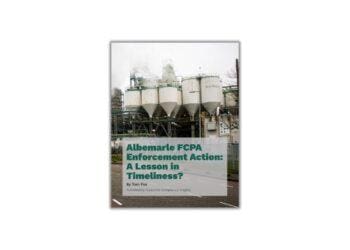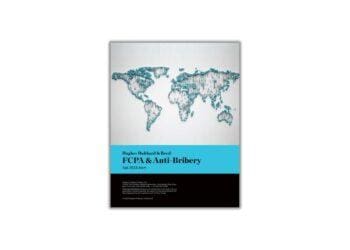Changes are on the horizon for FCPA prosecutions. Nicole Sprinzen and Kara Kapp of Cozen O’Connor offer guidance to help compliance professionals navigate the FCPA landscape given what’s to come, particularly in terms of white-collar prosecutions.
Every consideration of whether to self-disclose a violation of the Foreign Corrupt Practices Act (FCPA) ultimately comes down to one key question: If the company self-discloses, what will the company get in return? This has been a longstanding critical question for advisors to companies subject to FCPA jurisdiction. Current enforcement policies adopted by the Department of Justice (DOJ) beginning in 2016 address that question. In addition, case resolutions under those policies reveal trends of better outcomes for companies that report their own misconduct rather than those that wait to come to the settlement table until after an investigation develops.
DOJ Adoption of a Presumption in Favor of Declination
With its announcement in 2016 of a trial FCPA corporate enforcement program and its decision to make the program permanent in November 2017 as the current FCPA Corporate Enforcement Policy, the DOJ for the first time offered concrete rewards for cooperation by corporate entities in such investigations. For a company that self-discloses and remediates its misconduct and fully cooperates with the DOJ’s subsequent investigation, the company is eligible to receive a specific percentage – up to 50 percent – off the prescribed minimum and maximum fine ranges for organizations.
Additionally, in making the policy permanent, the Criminal Fraud Section, which has primary jurisdiction over FCPA enforcement, announced that it would apply a presumption in favor of declining prosecution where the company self-discloses the conduct and fully satisfies the DOJ’s expectations regarding cooperation and remediation of related compliance issues.[1] Thus, central to the assessment of a company’s cooperation in an investigation is whether the company self-disclosed, in addition to what other mitigating and aggravating factors have to be considered on balance.
Mitigating Factors Leading to Declination with Disgorgement
Declination letters issued over the last four years reflect the mitigating factors considered beyond the company’s self-disclosure, including whether the company:
- Undertook a thorough internal investigation;
- Implemented an enhanced compliance program in the wake of the misconduct where one was not already in place; or
- Made significant compliance program enhancements where the company already had a program; and
- Terminated or disciplined all employees involved in the misconduct, regardless of seniority.
The robustness of the entity’s existing compliance program and whether the conduct was identified by that program have factored heavily into several declinations, including Cognizant Technology Solutions,[2] Dun & Bradstreet,[3] Nortek, Inc.[4] and Polycom, Inc.[5] For example, the DOJ specifically singled out in the June 3, 2016 declination letter issued to Nortek that the decision was based in part on “the fact that Nortek’s internal audit function identified the misconduct” and Nortek promptly self-disclosed its findings.[6] In November 2018, Daniel Kahn, then Chief of the DOJ’s FCPA Unit, observed that since the enforcement policy was permanently adopted, all companies that voluntarily self-disclosed to the DOJ received declinations.[7] That remains true today.
With its formal policy adoption in 2017, the DOJ also included a new remedy: the declination with disgorgement. The Corporate Enforcement Policy cites the agreement to give up all profits connected with unlawful foreign bribery as a requirement to qualify for a declination. Indeed, since adopting the new policy, declinations issued by the DOJ have included accompanying agreements by the involved companies to disgorge all profits from the illicit conduct to the DOJ, Securities and Exchange Commission or another enforcement agency.[8] (In the Guralp Systems Limited (Guralp) case, the declination letter noted the company was subject to a parallel criminal proceeding by the U.K. Serious Fraud Office (SFO). Ultimately, in a move echoing the handling of these cases in the U.S., the SFO entered a deferred prosecution agreement with Guralp in December 2019 in which the company agreed to disgorge all profits but pay no fine.[9])
Still, these cases do not guarantee that self-disclosure of an FCPA violation will always lead to a declination. The DOJ has recognized that the presence of certain aggravating circumstances may override this presumption, but the trend has been for the DOJ to continue to issue declinations despite the existence of some aggravating conduct in a case.[10]
Aggravating Factors Do Not Preclude Declinations
Further to both the 2016 and 2017 versions of the policy, the DOJ will also consider the existence of aggravating circumstances in connection with resolving an FCPA case. These include:
- involvement by executive management of the company in the misconduct;
- a significant profit to the company from the misconduct;
- pervasiveness of the misconduct within the company; and
- criminal recidivism.[11]
Resolutions since the adoption of the policy have suggested that the balance still weighs heavily in favor of mitigating factors. For example, the DOJ has routinely awarded declinations even where there was knowledge or involvement of corporate leadership. The DOJ awarded declinations to Akamai Technologies, Johnson Controls, NCH Corporation, Nortek, Linde North America and Dun & Bradstreet, among others, despite knowledge of the misconduct by corporate leadership.[12] Undoubtedly a critical factor in these resolutions has been that the companies self-disclosed their misconduct.
Nonetheless, the DOJ policy makes clear that the presence of aggravating circumstances, particularly where they are present to a significant degree, “may warrant a criminal resolution.”[13]
Resolutions Where Aggravating Factors Outweigh Mitigating Factors
Even where the company voluntarily self-disclosed its conduct, the presence of significant aggravating factors may cause the DOJ to withhold a declination. For example, the DOJ did not grant declinations to companies in cases that involved high-profit bribery schemes exceeding $50 million, even though the companies promptly and voluntarily self-disclosed their misconduct.[14] The cases were resolved with a non-prosecution agreement (NPA), a formal agreement by the DOJ not to prosecute the company with an accompanying payment by the company of fines and disgorgement.
The single most notable factor that drives decisions as to how a case is resolved, however, continues to be whether the company self-disclosed its conduct. In cases that have been resolved through a deferred prosecution agreement (DPA) — an agreement in which the DOJ reserves the right to later prosecute the company for its misconduct if the company fails to live up to its promises — or have been criminally charged since 2016, the unifying characteristic in those cases is that the company did not self-disclose the misconduct before the DOJ began its own investigation.
In November 2019, the DOJ entered into a DPA with Samsung Heavy Industries concerning a $20 million bribery scheme where the company did not self-disclose its misconduct and in the course of the investigation provided substantial — but, according to the DOJ, not complete — cooperation.[15] The company’s cooperation included conducting an internal investigation, giving regular factual presentations to the DOJ, making foreign-based employees available for DOJ interviews and producing relevant documents. The DOJ concluded, however, that the company failed to investigate at the pace the DOJ requested. In addition to requiring the company to enter a DPA, in a rare move, the DOJ additionally lowered the cooperation credit awarded to the company for its partial cooperation.
In the Panasonic Avionics Corporation case, the company did not self-disclose its involvement in a $92 million bribery scheme, but did fully cooperate with the DOJ in its investigation.[16] As outlined in the DPA, the DOJ required Panasonic Avionics to retain a compliance monitor for a two-year period, followed by a two-year period of self-reporting to the DOJ because many of the company’s compliance enhancements had been implemented recently and therefore they had not been tested by the time of the settlement.[17]
In some cases where the company did not disclose the violation and more than one aggravating factor was present to a significant degree, the DOJ allowed one entity, either the parent or subsidiary, to enter into a DPA while requiring a related entity involved in the conduct to enter a guilty plea. For example, in December 2016, Teva Pharmaceuticals Industries Ltd. received a DPA for its involvement in an expansive bribery scheme resulting in more than $200 million in profits, but its subsidiary, Teva Russia, entered a guilty plea. There, the company did not self-report its misconduct and delayed in cooperating with the government.[18] The agreement also required the company to retain an independent compliance monitor for three years.[19]
Similarly, a year later, the Keppel Offshore & Marine Ltd. case was resolved with a DPA for the parent entity and a guilty plea by its U.S. subsidiary. The bribery scheme in that case involved over $350 million in profits and more than $50 million in bribes. In addition, the company did not self-disclose the conduct but substantially cooperated in the DOJ’s investigation.[20] Notably, in addition to the broad scope of misconduct, senior leadership was involved in the misconduct, including a member of the company’s legal team.[21]
Conclusion
FCPA case resolutions over the last four years reflect that the more weight a company dealing with a violation can put on mitigating factors, the more likely it will overcome aggravating circumstances in the case. Self-disclosure, fulsome and timely cooperation and the company’s efforts to remediate the misconduct are all key parts of the equation. Although never an easy decision, those factors, coupled with the DOJ’s current operating presumption toward issuing a declination where the misconduct has been disclosed by the involved company, may more readily weight the scales in favor of self-disclosure than in years past.
[1] Under the Corporate Enforcement Policy, there is a presumption that “[w]hen a company has voluntarily self-disclosed misconduct in an FCPA matter, fully cooperated, and timely and appropriately remediated, . . . the company will receive a declination.” See Department of Justice, Justice Manual, § 9-47-120, FCPA Corporate Enforcement Policy.
[2] Cognizant Technology Solutions Corp. Declination Letter (Feb. 13, 2009).
[3] Dun & Bradstreet Declination Letter (Apr. 23, 2018).
[4] Nortek, Inc. Declination Letter (June 3, 2016).
[5] Polycom, Inc. Declination Letter (Dec. 20, 2018).
[6] Nortek, Inc. Declination Letter (June 3, 2016).
[7] Christopher Cole, “Feds Say Tough FCPA Actions Continue Despite Declinations,” Law360 (Nov. 28, 2018).
[8] See, e.g., Cognizant Tech. Sol. Corp. Declination Letter (Feb. 13, 2019); Polycom, Inc. Declination Letter (Dec. 20, 2018); Ins. Corp. of Barbados Ltd. Declination Letter (Aug. 23, 2018).
[9] See Serious Fraud Office, News Release, Three Individuals Acquitted as SFO Confirms DPA with Guralp Systems Ltd.
[10] See Department of Justice, Justice Manual, § 9-47-120, FCPA Corporate Enforcement Policy.
[11] Id.
[12] See Dun & Bradstreet Declination Letter (Apr. 23, 2018); Linde North America Inc. Declination Letter (June 16, 2017); NCH Corp. Declination Letter (Sept. 29, 2016); Johnson Controls, Inc. Declination Letter (June 21, 2016); Akamai Techn., Inc. Declination Letter (June 6, 2016); Nortek, Inc. Declination Letter (June 3, 2016).
[13] Id.
[14] See, e.g., In re General Cable Corp., DOJ Fraud Section, 2016 Related Enforcement Actions (Dec. 29, 2016).
[15] See DOJ Office of Public Affairs, Samsung Heavy Industries Company Ltd Agrees to Pay $75 Million in Global Penalties to Resolve Foreign Bribery Case (Nov. 22, 2019).
[16] See DOJ Office of Public Affairs, Panasonic Avionics Corporation Agrees to Pay $137 Million to Resolve Foreign Corrupt Practices Act Charges (Apr. 30, 2018).
[17] Id.
[18] See DOJ Office of Public Affairs, Teva Pharmaceutical Industries Ltd. Agrees to Pay More Than $283 Million to Resolve Foreign Corrupt Practices Act Charges (Dec. 22, 2016).
[19] Id.
[20] DOJ Office of Public Affairs, Keppel Offshore & Marine Ltd. and U.S. Based Subsidiary Agree to Pay $422 Million in Global Penalties to Resolve Foreign Bribery Case (Dec. 22, 2017).
[21] Id.












